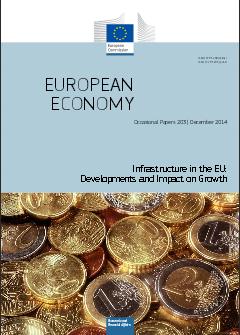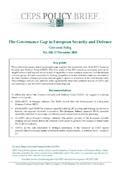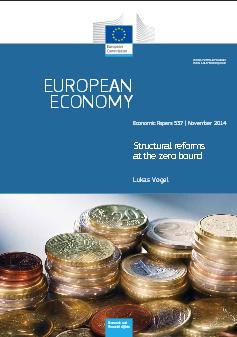Bordo, M. & Siklos, P. (2014) “Central-bank credibility, reputation and inflation targeting in historical perspective“, VoxEU Organisation, 12 December. Central bank credibility is critically linked to communication and commitment. This column analyses the historical evolution of credibility, showing its prewar peak and the subsequent dip from which it did not fully recover until the 1980s. Inflation targeting has played a key role in establishing credibility in both developed and …Read More
ECJ legal rulings designed to help the Eurozone are threatening the accountability of European governance
Beck, G. (2014) “ECJ legal rulings designed to help the Eurozone are threatening the accountability of European governance“, LSE EUROPP, 10 December. One of the most controversial issues during the Eurozone crisis has been the extent to which policies aimed at resolving the crisis, such as the decision by the European Central Bank to adopt ‘Outright Monetary Transactions’ (OMT), comply with EU law. Gunnar Beck writes that the European …Read More
The European Union Is the Global Laggard on Basel III – the Basel Committee found the EU “materially non-compliant” with Basel III
Véron, N. (2014) “The European Union Is the Global Laggard on Basel III – the Basel Committee found the EU “materially non-compliant” with Basel III“, Bruegel Institute, 08 December. On Friday, December 5, the Basel Committee on Banking Supervision published its reports on the compliance of rules adopted last year in the European Union and in the United States with its global accord on banking regulation, adopted in 2010 …Read More
Τhe Sense and Nonsense of Eurozone Level Democracy
Verhelst, S. (2014) “Τhe Sense and Nonsense of Eurozone Level Democracy“, Egmont Paper 70, Royal Institute for International Relations, October. EXECUTIVE SUMMARY The democratic functioning of the EU is frequently called into question. Increasingly, the focus of this criticism is the perceived lack of legitimacy in eurozone policy-making. The eurozone has gained a firmer grip on national policy-making in recent years, but has not adapted its democratic structure to …Read More
Putting an accurate price tag on government credit support
Lucas, D. (2014) “Putting an accurate price tag on government credit support“, VoxEU Organisation, 05 December. Governments run the world’s largest financial institutions. The size of government activities has grown in recent decades but comprehensive estimates are unavailable. This column presents new evidence on the costs of government credit support. It argues that governments tend to understate credit costs and the consequences of that could be considerable. Cost underreporting …Read More
Europe: When the Unthinkable Becomes Possible
Europe: When the Unthinkable Becomes Possible, Geopolitical Diary – STRATFOR Global Intelligence, 03 December. Europe’s economic crisis is slowly but steadily eroding the political systems of many countries on the Continent. New actors are emerging and threatening the supremacy of the traditional players. Alliances and events that seemed impossible only a few years ago are now being openly discussed across Europe. On Dec. 3, for example, Sweden announced it …Read More
Infrastructure in the EU: Developments and Impact on Growth
Brons, Μ., Kalantzis, F., Maincent, E. & Arnoldus, P. (2014) “Infrastructure in the EU: Developments and Impact on Growth“, European Economy – Occasional Papers–No. 203, European Commission Publications, December 2014: Brussels. Today, investment needs are high in areas such as research, innovation and ICT which are important drivers of growth and competitiveness. However, there are also arguments to suggest that Europe should invest in energy and transport infrastructure. Energy …Read More
Investment as the key to recovery in the euro area?
Gros, D. (2014) “Investment as the key to recovery in the euro area?“, Economic Policy, CEPS Policy Briefs Νο. 34, 18 November. Investment has declined in the euro area since the start of the economic and financial crisis, but this does not mean that there is necessarily an ‘investment gap’, explains Daniel Gros in this CEPS Policy Brief. Investment was probably above a sustainable level due to the credit …Read More
Structural reforms at the zero bound
Vogel, L. (2014) “Structural reforms at the zero bound“, European Economy – Economic Papers. Νο. 537, European Commission Publications, November 2014: Brussels. This paper uses the European Commission’s QUEST macroeconomic model to analyse the impact of structural reforms on economic activity in an environment in which the zero bound on monetary policy rates is temporarily binding. The simulations suggest that although such reforms can have a negative impact on …Read More
Addressing long-term unemployment in the aftermath of the Great Recession
Katz, F. L., Kroft, K., Lange, F. & Notowidigdo, M. (2014) “Addressing long-term unemployment in the aftermath of the Great Recession“, VoxEU Organisation, 03 December. In the aftermath of the Great Recession, there remains a large number of long-term unemployed across countries. This column argues that policies targeting the long-term unemployed, if effective, may have substantial benefits for the aggregate labour markets. However, evidence of the effectiveness of active …Read More







